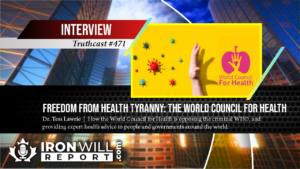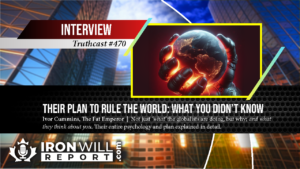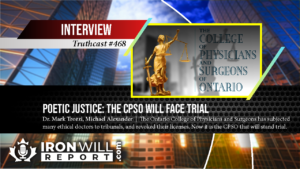The Shot They Don’t Want You to Know About | Dr. Nikolai Petrovsky
September 29, 2022
- What is COVAX-19?
- How does it compare to the experimental mRNA injections?
- Why did Nikolai’s company abandon the mRNA tech?
- How did MSM cancel information about COVAX-19?
- Why is COVAX-19 not producing the same adverse events as mRNA-based?
LINK:
Please share on your social media accounts
Will Dove 00:14
You were all aware of by now the dangers of the so called mRNA vaccines. I have with me today Professor Nikolai Petrovsky founder of Vaxine, an Australian-based biotechnology company that over the last 20 years has developed an extensive portfolio of vaccines and immunotherapies, including vaccines against influenza, hepatitis B, and Japanese encephalitis plus immunotherapies against allergies and cancer. Dr. Petrovsky has published over 200 Peer Reviewed original research papers as well as many reviews and book chapters, and has won multiple awards and prizes for his work. I last interviewed Professor Petrovsky in November of last year on vaccines Covax-19 vaccine, a vaccine based upon traditional technology, not mRNA, and which at that point in time had been administered to 12,000 recipients in Iran with zero severe adverse reactions. Dr. Petrovsky is here today to give us an update on the COVID vaccine that big pharma doesn’t want you to know about. Professor Petrovsky. Thanks for joining us.
Prof. Nikolai Petrovsky 01:19
Good morning. Will,
Will Dove 01:20
So, if you could give us an update, because yes, as we spoke last time, your vaccine Covax-19 had been administered to 12,000 people in Iran, no severe adverse reactions. At that point in time, you had told me that the government of Iran had ordered another 1 million doses. Where are we at now?
Prof. Nikolai Petrovsky 01:36
So we’ve come a long way, Will. So, reflecting on it, back then, we finished the phase three clinical trial in just under 17,000 individuals, we got approval, as you mentioned, we initially sold a million doses to the program there that that was increased to 6 million doses, which were all delivered safely. And subsequently, we did a clinical trial of getting a third dose booster of the vaccine and got approval in January for a choose both as primary course but also as boosters for people who’ve had other vaccines previously. So this is on top of if people want to cross over from having other vaccines that have had say, side effects to or they just want to explore a different technology, they are now able to do that in Iran with our vaccine. So, you know, everything looks good. You know, we’ve got clear evidence, particularly in the booster study that we’re inducing neutralizing antibodies against the Omicron strains. And we’ve just published a number of papers on that. But of course, we’re still madly looking and developing, you know, variations of the vaccine to see can we improve it in particular, you know, can we tackle a new BA-4 and BA-5 strains, which are causing major problems around the world? Can we broaden it so that it protects against all strains, even future ones? You know, can we block transmission, which is the big weakness, of course of the mRNA vaccines is they have no effect on infection or transmission these days. So the job just keeps going on. But we’ve come an enormous way over what it’s only really six months, it’s feels like a lifetime.
Will Dove 03:34
At this point in time, how many people have been injected with Covax-19?
Prof. Nikolai Petrovsky 03:38
So I don’t know the exact numbers because again, that we supply the vaccine to the Iranian immunization programs, and then they distribute and use it, but it’s definitely in the millions of doses.
Will Dove 03:52
Now, I’m certain of course, you know, I know you’re a very conscientious scientist, and you’ve no doubt been doing follow up studies with at least a percentage of the people who are receiving these vaccines. Are you seeing any cases of people? And you did mention in your last interview, that it’s two shots? I think you said taken about three weeks apart, correct me if I’m wrong on that. And so are you seeing with these people who have been vaccinated with Covax-19? Are you seeing them getting infected with COVID after their injections?
Prof. Nikolai Petrovsky 04:20
Just to explain It’s now three doses. For the reason, well, there’s a number of reasons. One is that like everything, two doses doesn’t last forever, and we’ve never suggested that so you know, people will need boosters, we don’t know yet whether they’ll need them as frequently as the mRNA or less frequently, but it’s currently three doses we’re using in terms of infection. We certainly, like all of the vaccines and this is true from day one, with the vaccines you do see what we call vaccine breakthrough infections. In other words, there are people who’ve been vaccinated with our vaccine, like every other vaccine who do get, unfortunately, an infection. So it’s what we call a breakthrough. The good news is that the risk of that infection being serious is dramatically lowered by having the vaccine. And of course, that also has been a feature of the other vaccines. So, as I say, you know, the vaccine does protect against infection and serious disease. But like everything, it’s not 100%. So no one should assume just because they’ve had our vaccine or any other vaccine, that it’s impossible for them to be infected and transmitted. And I think that’s the problem of the government’s messaging has been really to not to mislead people to make them think you have one of these approved vaccines, then you won’t get infected and you won’t transmitted to your loved ones. That’s never been true. And of course, over time as vaccines were off, it becomes less and less true. But it was never true to start with.
Will Dove 06:11
Dr. Petrovsky, I want to take a little bit of a left turn because I want to access your knowledge as an immunologist. And if you could explain to our audience why it is, for example, if let’s say I go and I get a tetanus vaccine, I’m probably good for 10 years. But if I go get an influenza vaccine, well, I need another one next year, or as you said, you know, with these COVID vaccines, even with your Covax-19 vaccine, the immunity wears off, you know, in far less than 10 years. Could you explain for our audience why that would be?
Prof. Nikolai Petrovsky 06:38
So there’s multiple factors sitting behind that. It’s not unusual, you know, to need three or four doses initially to prime the immune system. And so Hepatitis B for instance, we give our children four doses. After that, they then are protected basically for life. So it needs for to get them up to the right level, and then it stays there. So the you know, we were always very critical of the, again, the messaging from the government way back when this started that you only need two doses, and you’ll be fine. Because that’s not the experience with other diseases. So we were always expecting that there’d be a need for more boosting to get to a strong level of immunity, whether that’s three doses, or potentially four doses, but with a good vaccine and a traditional vaccine, that should then be enough. And from there, you should be pretty well, right? At least against the strains against which the vaccines being designed. So now comes the second proviso or the second catch, which is that whereas the Hepatitis B virus, you know, hasn’t really significantly changed over the last 50 years, we’ve been using the vaccine. I mean, there’s tiny changes, but the overall it hasn’t actually affected the effectiveness of the vaccine. So one, the hepatitis B vaccine after four doses gives you this very long, lifelong immunity against the virus, and the virus hasn’t changed to get around that immunity. So when we’re looking at COVID-19, we’re in a totally different situation. We’ve got an mRNA virus and mRNA viruses mutate at an extraordinary rate, compared to say Hepatitis B virus. So now we have a very adaptable virus that actually is evolved and this is true again, and we knew this from day one that all Corona viruses are incredibly adept at escaping immunity pre existing immunity, and this is one of their features and it’s not just COVID-19 it was true of this original SARS Coronavirus. It’s true of MERS, you know cat feline Coronavirus, all the corona viruses out there do this. So we were always predicting it wasn’t just a problem of how do we induce really strong immunity with our vaccine, which we knew to be done might need, you know, three or four doses, but then how do we stop the virus going around that mutating and now coming back into all of those vaccinated people and causing new infections and that’s exactly what you know, we’re currently seeing it was all predictable. You know, more than two years ago that this was going to be the consequence of these programs. And yet, you know, they just turned a blind eye and ignored that science and said everything will be all right. So what we’ve tried to do with our vaccine is one, ensure that it provides strong immunity against you know, the original strains of the virus, but also tried to do in the capacity to essentially predict the future and stop the virus being able to go around the vaccine, and that requires a different strategy to just use the same old vaccine time and time again. And we’ve seen the failures of that strategy with the mRNA vaccines, where you know, you give them three times they might protect for eight or 10 weeks, you give the fourth dose. I mean, we just had a famous immunologist here a couple of weeks ago, went, on radio, he went into heart failure after having his fourth dose of mRNA and was infected four weeks after the fourth dose. It wasn’t working. And not only wasn’t working, but he got extremely sick. I mean, that should be like the canary in the coal mine, that should be ringing alarm signals around the world, that this strategy of using mRNA vaccines in this way, it has completely failed, and there needs to be a global reset. And really, they should stop using those vaccines until they understand better what’s going on.
Will Dove 11:09
Right. And you had mentioned in our last interview that you had originally examined or looked at the mRNA technology as an option but you abandon that. And may I assume that the reason was for everything, you’ve just said that you knew that it was going to cause problems?
Prof. Nikolai Petrovsky 11:23
Well, what we knew, and what we believed we knew is that this technology was so experimental, and there was so many unknowns, we didn’t think any sane regulator in the world would ever allow this to be used in large numbers of people without 5 or 10 years more testing. And so we actually abandoned because we made the assumption which turned out to be not true, we obviously have lots of crazy irresponsible regulators out there. You know, they just rubber stamp that and pushed it through despite the fact that there was really no science to underpin those vaccines. We really had no idea what they were going to do. To be frank, I still don’t think we have any idea what these vaccines are doing in the body and what they might do in the long term. I mean, we’re learning as we go, you know, experimenting on billions of people. It’s not something that when I was trained as a doctor and a scientist, that was exactly the opposite of what we were trained to do. You don’t experiment on billions of people, the global population.
Will Dove 12:37
Nikolai, I want to back up to something that we I asked you earlier about people getting infections after getting these vaccines. And what we’ve got now is data that many of the scientists and experts that I’ve interviewed have said clearly shows that people who are being injected with these mRNA injections, not only are not protected, they’re more susceptible to infection, that our hospitals are now being filled with COVID patients who have been injected with these mRNA so called vaccines. So when I asked about Covax-19, and people getting infections afterwards, and you give a very honest answer to that, saying that that can happen with any vaccine. But at what rate are you seeing this happening is a very small number, some can you give us some indication on that?
Prof. Nikolai Petrovsky 13:20
You know, the rate of breakthrough infections is, you know, increases over time, what we haven’t seen is, you know, a situation which we have seen with, with published data from Canada, and, you know, from the UK and Scotland and a whole range of countries now, when in fact, you see, you know, one, the rate of infection increasing to the point where the vaccine is no longer protecting, so you hit zero, and then you see the curve continue to go below zero. And what that potentially is, well, what it is saying is more people who are vaccinated are getting infected than people who are not vaccinated. And you have to shake your head and say, What’s going on there? Why is that signal appearing in datasets all around the world? So it’s not just one data set that may be flawed, or, you know, that the analysis hasn’t been done properly? We’re seeing this consistently, you know, from multiple data sets, multiple countries around the world. The one consistency is it’s all happening in countries who have embraced the mRNA vaccines. So we’re not seeing similar data coming out of India, China, even Russia, or Iran, with this, you know, suggestion that people who’ve been vaccinated have higher rates of infection. So, what do we know about coronaviruses? Let’s go back to 101 of Coronavirus it’s not just COVID or Coronaviruses. Well we know that Coronavirus is susceptible to vaccine enhanced infection. Alright, so there there’s cat Coronavirus, vaccines where more of the cats were dying and who got vaccinated them weren’t vaccinated. So they had to abandon that vaccine. We saw it with the original SARS virus in animal models, where if they were vaccinated – not with our vaccine, I might add, we actually only saw protection, which was fabulous. But with the traditional other vaccines, what they were seeing again, is the vaccinated animals were getting much sicker, and were more likely to get infected than the unvaccinated this is this is a well known scientific phenomenon called vaccine enhanced infection. We warned two and a half years ago that this was a very high risk with COVID 19 vaccines, again, it was completely ignored by the policy makers, and by the developers of the mRNA vaccines that said, don’t worry, you know, this experimental technology, we haven’t tested it, but we don’t believe this is going to be a problem. I think that what we’re now seeing is actually vaccine enhanced infections.
Will Dove 16:16
Yes. And I asked that question to ask this one because you’re absolutely right, we’ve got loads of data now to show that people who have taken these mRNA injections are actually having their immune systems damaged, crippled, to the point where they’re more susceptible, more likely to get sick, more likely to die. But earlier in the interview, you had mentioned cross vaccination, people who had had mRNA injections, and then they got Covax-19, did that restore their immunity, it didn’t then give them that protection that they would have had if they hadn’t taken the mRNA injections in the first place?
Prof. Nikolai Petrovsky 16:46
Because we did the booster study in Iran, they don’t use mRNA vaccines in Iran. So they use a variety of technologies like the AstraZeneca adenoviral vector vaccines are used, and you know, Chinese and Iranian equivalents of that. They use the inactivated whole virus vaccines that are widely used in India and China. And they use, you know, Covax-19 or, or Spikogen. So, so that’s the portfolio, they’re not using mRNA. So in the booster study, we obviously were recruiting from the population. So we were boosting people who’d had inactivated virus, the live adenovirus vector, and people who’d had Spikogen. And we saw beautiful boosting, in all cases, we had about six people who traveled out of Iran and got mRNA vaccines elsewhere. And so we similarly saw boosting of those people. So but it was a very, as I say, just a handful of people. So we’re about to do another clinical trial here in Australia, because again, mRNA has been the flavor of the month here. And so we might be able to do a booster study here to more directly answer that question you’re asking, which is, you know, how well does the people who’ve had mRNA react when they get a protein based vaccine after that. I think we do have animal data and the animal data is, is quite interesting, because we immunized animals with the mRNA and then gave them our protein vaccine, or we gave them the protein and then we gave them mRNA. So what we saw is that if we prime the animals with a couple of doses of mRNA, we had really great responses to protein. So protein could sort of boost the immunity of the mRNA. So we think that that will be a successful route to get people off mRNA interestingly, when we did the opposite, so we gave our vaccine now we gave the mRNA. No response to us signaled mRNA for whatever reason. Yes, it can prime the immune system but then as you give more doses, it becomes very problematic. It’s it’s actually switching the immune system off and tolerating it. We can obviously at least if you’ve only had to doses, you know, essentially rescue the immune system based on the animal studies with a protein and normalize it, but if you’ve already had protein based vaccines, then it’s pointless to give mRNA at that point. So it just shows how complex these things are, they’re not linear. And you know, they’ve been way too many assumptions by up to now ignoring everything we know that Coronaviruses and how they respond to vaccines. So we really have to go back to the science and use the science to inform us going forward but unfortunately, even the science is highly biased these days because, you know, there’s a lot of money influencing what gets published. what doesn’t, you know what gets done, what doesn’t. So there’s a filter being applied at all levels, not just the media, but, you know, even in scientific publications, to just disseminate the one single message, which, unfortunately, is largely a false message, that these vaccines are safe and effective. And again, to stop the pandemic, unfortunately, there’s absolute evidence, that is not the case, we have to do something different. And we have to start doing that now. I mean, you know, giving fourth, fifth sixth boosters of mRNA, when they’re clearly not working, in itself, you know, is stupidity, I think the definition of stupid is doing something that hasn’t worked, you know, multiple times, and then thinking it will work, you know, if I do it one more time, I think we’re in that situation with the mRNA vaccines where we have to realize this isn’t working. And we’re stupid. If we keep flogging a dead horse, let’s, you know, reset, look, explore other technologies, other approaches maybe go back to the true and tried old technologies, you know, inactivated viruses, recombinant proteins, you know, they’ve worked successfully so many times in the past. Why are we ignoring them now?
Will Dove 21:23
and I want to get back to that censorship of scientific debate in just a minute. And specifically in your case, and something that we discussed in the last interview. But first, I wanted to just confirm what you’ve said in response to my questions about being able to restore a person’s immunity if they’ve been injected with the mRNA. And I realized I’m asking a very conscientious scientist to make a guess, based upon very sparse data. But it sounds to me like what you’re saying is, there’s great hope that the Covax-19 vaccine could in fact, do that, that it could take people who had their immunity, their immune systems damaged, leaving them wide open to new infections from COVID-19 by the mRNA injections, you give them Covax-19, and it could restore their immunity?
Prof. Nikolai Petrovsky 22:03
The answer is at this stage, we don’t know, you know, because we just don’t have enough data. And also, we’ve only given it to people who’ve had two doses of the mRNA. Now, you know, we don’t see these, what I would say call negative effects of mRNA. Until people have had multiple boosters, you know, I think the more boosters, the more problematic it becomes, when you restore, you know, the immune response in those people that protein, I would be worried that it won’t be possible, because, you know, the further you drive down that pathway, you know, the harder it is to come back. So we know that, as I say, and from the little bit of human data, and from our animal data that yes, we can sort of reset things after you’ve had two doses of the mRNA. I can’t comment on whether we can do that after three and four. And I would be very concerned that we won’t be able to, it will unfortunately be too far gone that you need the data, we need to be doing those studies. And that’s why it’s a priority right now for us to do studies of giving vaccines as a booster in people who’ve had now three, four, maybe in some cases, people have had five doses of mRNA. And then we can compare how what’s happening after people who’ve had two doses of mRNA, and then converted over what’s happened after three, I think that’s gonna be an extraordinarily important data set. Obviously, we’re not receiving any help to generate that data. And that also tells you something about what’s going on, not just in Canada, but in Western countries around the world. And the censorship of science and the selective funding only of scientists that provide reinforcement for what clearly is a false scientific narrative.
Will Dove 24:05
As I said, I wanted to address that, because if I recall correctly, and I may not because it has been many months since our last interview. But as I recall, you had to do a fundraising campaign to come up with a million dollars or it was something or close to that, for I believe it was to put in the licensing application for your Covacs-19 vaccine, which seems insane. We’ve got governments giving carte blanche these mRNAs but you have to raise public donations just to go for the license for yours
Prof. Nikolai Petrovsky 24:32
So you know, when did it become a crime to actually ask people to donate their own money to a worthy, you know, research cause? That is what they were attacking the how do you get the public to donate to your research program, we thought we had killed your program and cut it off from all government funding, you know, how dare you go around that and actually have the public. We’re seeing democracy turned on its head and be totally perverted through the last two and a half years. It’s terrifying, you know, not just as a vaccine developer, but as a doctor, seeing all of my colleagues who’ve spoken out and had been terminated in the sense of, you know, they’ve lost their jobs, they’ve been struck off by the medical regulators for expressing an opinion, you know, these are extraordinary times, I don’t think we would have been through anything similar or I wasn’t around. But I think since 1930s, Germany, is probably the closest analogy and we now probably almost into 1940s, Germany. I mean, we’re in in scary times. Yes, it is shocking. And not only did you know, we have to crowdfund, you know, to support the funding for the trials and attempting to get regulatory approval, but we were then attacked by the mainstream media for daring to crowd fund a COVID 19 vaccine, you know, truly extraordinary. It was a concerted campaign. It was obviously carefully organized, and I think we can be fairly confident where that campaign had its origin was probably in the certain companies headquarters in the United States, you know, printing hundreds of billions of dollars, and they are driving the narrative globally.
Will Dove 26:24
Very much so and unfortunately, it’s global Professor Petroski. If I did my homework correctly, on your website, it says that the Covax-19 vaccine is a recombinant whole spike protein vaccine, is that correct?
Prof. Nikolai Petrovsky 26:37
So, you know, it’s like everything when you’re trying to explain things to people, you have to dumb it down a bit, the technicalities are very, very complex. Not everyone make a vaccine. So it —
Will Dove 26:50
— this is where I was going with this as I was going to ask you to explain the difference between the Covax-19 vaccine and the mRNA. Because I know that some people will see that full spike protein in there. And it’s the spike proteins that have been causing a lot of problems with the mRNA. So if you could explain why it is that the Covax-19 vaccine, which obviously is using a spike protein, but it’s not causing all these serious adverse reactions that we’re seeing with the mRNA.
Prof. Nikolai Petrovsky 27:15
So it’s a very good question. And it’s obviously one, we’ve spent a lot of time trying to figure out why there are these differences. As you say, there is a there is a degree of commonality and then all the vaccines globally, you know, are based on the spike protein because we know that that’s the vulnerability of the virus. You know that if you have good neutralizing antibodies against the spike protein, the virus can infect your cells and it’s a logical target – it worked for SARS, SARS vaccine, it worked for the MERS Coronavirus vaccine. So targeting the spike protein of the coronaviruses is a well proven approach and that that’s why everyone took that approach. But as you say, we’ve seen some concerning side effects of particularly some of the vaccines. So you know, the adenovirus vector vaccines have thrombosis, which we now have some understanding of the incomplete as to why they were doing it and not the others. We’ve had the mRNA with the myocarditis, pericarditis and a range of other issues, which we don’t appear to share. So obviously, it isn’t just about the spike protein. Now as spike protein has been modified. You know, we call it the full length spike protein, but it’s only the bit of the spike protein that’s outside the cell when the virus is making the spike protein spike protein inserts into the membranes of the cells and sits on the outside of the cell that’s still attached to the cell. And we believe that that’s where the problem lies, actually is what you would recall the complete spike protein, including the bit that attaches to the cells. What we did is we removed the bit that attaches to the cells. So what’s different about our spike protein from even Novavax, which is also a protein based vaccine, where we differ from all of them is we’ve only got the piece of the spike protein from outside the cells, our spike protein doesn’t – it isn’t attached to the cells. Whereas if you give the Nova Vax spike protein, it will fuse back with the cell membranes and be expressed in the cells. If you give the mRNA again, the full length of the spike protein including that attachment to the cell membrane, so when the mRNA gets inside the cells and expresses the protein, that protein will go to the cell membrane and then sit in the membrane, you know, because of that difference. I mean, obviously, I have to speculate that it’s it’s having spike protein inserted in cell membranes of cells in the body that is the major cause of these side effects that we’re seeing now. because our spike protein doesn’t attach to cells in that way, you know. We’re hypothesizing again, we don’t know the full answer. But we’re hypothesizing, Will, that’s the key difference. It could also be our adjuvant. So we have a sugar based adjuvant that’s unique. We’ve been working on it 20 years. Again, we have it in our flu vaccines and a whole range of other vaccines you mentioned that we’ve been developing. And it has some quite unusual extraordinary properties, we adjuvant in that it’s anti inflammatory. Now, no one’s ever heard of an anti inflammatory adjuvant. Immunologists will tell you adjuvants have to be inflammatory. We found out that that actually is not true was just an assumption. And you could have an anti inflammatory sugar based adjuvant. And we’ve been supported, I’d have to say, by the US government through the NIH, you know, to advance that adjuvant because it is so unique over that time. So maybe it’s our anti inflammatory adjuvant that’s also switching off some of these adverse pathways that have been switched on by the other vaccine. So again, like anything, you have the observation, it’s not doing this and those are, and then you look for what are the differences? And I hypothesize it must be one of those differences. But as I say, is it you know, the fact that we only have the extracellular domain or outside part of the spike protein? You know, is it our adjuvant? Is it both of those things? The answer is you know, that’s difficult to say the beauty of it is we know that it isn’t causing the problem.
Will Dove 31:42
And for the benefit of our audience, could you briefly explain what an adjuvant is?
Prof. Nikolai Petrovsky 31:46
So an adjuvant is any compound and it really covers a very broad range of different molecules that you can add to a protein to make it stimulate an immune system better. So to it’s basically think of it as a turbocharger, you bolt a turbo charge into a car engine to make it more powerful. That’s all it does. I mean, it just increases the power of the engine. It’s not an engine in its own right. So the same as an adjuvant is the turbo charger for a vaccine, it’s not a vaccine, by itself, you know, often will do nothing. But when you bolt it on to the protein of the vaccine or the killed virus of the vaccine, if you’re talking about influenza, then now the vaccine works dramatically better, it induces more neutralizing antibody, induces more antiviral T cells. The magic is how does it work? And like most people don’t understand how a turbo charger works. You know, many people don’t understand how an adjuvant works. But But essentially, it’s a compound you add to the vaccine to make it more effective.
Will Dove 32:58
So the Covax-19 vaccine is using a sugar-based adjuvant and what has been used in the mRNA injections?
Prof. Nikolai Petrovsky 33:05
So that’s interesting So the mRNA itself is an adjuvant. So what most adjuvants are trying to do is to stimulate receptors on cells that activate what we call inflammatory pathways, because if you have a degree of inflammation at the site, you inject the vaccine, you know, that is known to enhance the immune response. It also gives you side effects, unfortunately, so it’s a double edged sword. We were the first to develop an agent that doesn’t have that problem. So it gives you the benefits without the harm. But normally adjuvants, unfortunately, there’s a price you pay because they cause inflammatory side effects by their nature. So mRNA itself is an inflammatory adjuvant. And in fact, if you look at the history of the mRNA vaccines, initially, they were so inflammatory, that they weren’t effective. And they had to down modulate them. And we get into the sort of what modifications did they make to them, and arguably, they shouldn’t be called mRNA because they’re not mRNA, they’re not they, you know, again, there’s degree of false messaging out there that this is just like normal mRNA in the body, and it’s broken down in, you know, a few seconds to a few minutes simply not true. What’s being injected is a synthetic molecule that has some features of mRNA, but it’s not mRNA it’s not broken down. It was actually designed not to be broken down. So why are we pretending that it is broken down? And why are we pretending that it’s mRNA? When it’s not, it’s not the way the drug industry normally works. If you have a synthetic molecule that isn’t in nature, you don’t call it the same thing as in nature, you call it something different. So, so yeah, as a consequence, the adjuvant effective mRNA is actually intrinsic to the mRNA and also to the lipid nanoparticles because lipid nanoparticles are also very inflammatory. And so again, you’re back to a traditional inflammatory adjuvant. And again, that’s some of the side effects we see with mRNA. People as sick as dogs for two or three days often, you know, with like flu like symptoms. That’s a classic feature of an inflammatory adjuvant, if you were to use one, so that’s actually a feature of the mRNA.
Will Dove 35:45
And I’m glad you brought up the lipid nanoparticles because that was going to be my next question. I know quite a number of researchers who feel that the lipid nanoparticles themselves are causing some of the damage from these injections. So may I assume that the Covax-19 vaccine does not have a lipid nanoparticles shell?
Prof. Nikolai Petrovsky 36:02
No, it doesn’t. It’s a soluble protein, whereas in fact, even the Nova Vax actually is also a lipid nanoparticle. And, you know, we’ve now seen the FDA say that nano Vax vaccine is causing myocarditis, though, in fact, the FDA have said it’s actually causing more myocarditis than the mRNA vaccines, which themselves are causing a very high rate like that. That’s a major concern. And interestingly, like the mRNA, it’s the full length spike protein with this transmembrane domain that attaches to the cells. And it’s in a nanoparticle. And so you know, you have to think the opposite of what we’re talking about before, what is special about them that they’re both causing myocarditis? Well, they’re both in this nanoparticle form. And they both have spike protein that includes the piece that attaches to the cell membranes. And so that’s why I hypothesize, they are the features that are the problem here that we don’t share.
Will Dove 37:11
Professor Petrovsky, you’ve made a vaccine that clearly works effectively has very, very low rates of adverse reactions. And you’ve said that that’s largely due to the fact that you’ve got this spike protein that’s missing the bit that causes it to attach to the cell. So clearly, that bits not necessary. So why do you think that Pfizer and all these other big pharma companies are making these so called vaccines with a spike protein that is designed to enter the cell when clearly from your own research that’s not needed?
Prof. Nikolai Petrovsky 37:44
The answer is the simplest thing to do when you’re trying to make a vaccine in a rush is to not to make as few modifications as possible, because you just taking the protein from the virus and you’re putting it into your mRNA, or your viral vector or expressing it as a synthetic protein. So that intuitively is the easy thing to do. Because you’ve taken it directly from nature, when you start chopping pieces and the protein off, in fact, problems can arise. So the spike protein has to assemble in a structure, which is called a tri-mer, that means three chains of the spike protein have to sort of bind together and form to look what looks like a cone like structure. And it’s only in that structure, that it induces the right antibodies. When you cut away that piece of the spike protein and attaches themselves, then you have to find a way to still get the protein to assemble into that particular structure turns out to be extraordinarily difficult to do. We managed to solve it, I can’t say it was simple. And that is why our vaccine works. But if anyone else just tried to copy and just think you can just do this and have something that works, I can tell you that it won’t. That’s through bitter experience. So the minute you start engineering, a protein, all manner of things can happen. And the answer is you have to really know what you’re doing. And there’s still a large trial and error element to it to get it right. And, you know, the other companies weren’t interested in investing the time and the science, you know, they just wanted to get it out there and on the market, whereas we felt it was more important to get the science right. So we persisted with finding a way to get that piece of the spike protein to assemble in the right way. And having solved that obviously, we’ve seen the results that we have, but it wasn’t easy.
Will Dove 39:51
I imagine not. Getting back to the licensing, you had to go through extreme measures to raise funds for this. Have you at this point in time been able to get Covax-19 approved for use anywhere other than Iran?
Prof. Nikolai Petrovsky 40:03
No. So currently, the only country where we’ve actually applied for approval is Iran. So the question is, why are we not applying elsewhere or haven’t we applied for elsewhere in the last six months or so, the answer is six months is an extraordinary short period of time. And what we’ve seen is the need for booster doses. So we had to focus on the Iranian market, which is, well, now we’ve moved beyond two doses, if we we’re to maintain this market, we have to do a trial and focus on a third dose and get that approved in Iran. So that takes an enormous amount of effort, which we’ve successfully done. We also have been engaged in a study in children. So children from five years and above, because currently, the approval is for people 18 years and older. So we’ve just completed that study in children, and we’re just putting together the data to publish and also to get regulatory approval to extend that. So until all of that work is done in what essentially is our primary market, you know, with, we simply don’t have the bandwidth and the resources to be going through these complex processes in multiple countries at the same time. So we think it better to get all the package sorted, get all of the answers to these questions and boosters, you know, crossing over from other vaccines to ours. You know, children, tackling and showing vaccines protective against Omicron, BA4 and BA5. We’re always going to be judged by you know, different rules to what the existing vaccines are going to be judged by. Make no mistake, we will be asked for the impossible, we will be asked for evidence, you know, we can give 95% protection against Omicron BA4 BA5. The other vaccines haven’t been asked for proof that they protect against even Delta let alone Omicron. We’re fully expecting is we’re going to hurdle – or the bar that we’re going to have to jump over to get approval in these countries which are dominated with mRNA is going to be ridiculously high. And there’s no point in us going in half prop without answers to every conceivable question showing we’re superior in every conceivable way. Because we’re not naive, we know that the regulators in these countries are basically owned by big pharma. I mean, that’s the reality. The governments in these countries are owned by big pharma. So Big Pharma are calling the shots there. So we’re not going to be allowed to just come in and sort of on equal terms and get our vaccine approved. It’s going to be a long, hard road, unfortunately. And, you know, we hope we get there. But there’s no guarantee of that. But, you know, we’re totally reliant on the support of just members of the public. We don’t have any support from the official side of this. And so it is going to be tough.
Will Dove 43:11
Nikolai, I hesitate to even ask this question, because I know it could be taken as pandering to conspiracy theories. But we do have cases of scientists who have spoken out against these mRNA vaccines who have revealed things that they found in them, they’ve died under very mysterious circumstances. Are you concerned for your life?
Prof. Nikolai Petrovsky 43:29
This is more about, you know, biasing the narrative, you know, and that’s been very effective. So far, I don’t think anyone needs to resort to anything more than that. I mean, it’s easy to silence people just by attacking them and discrediting them using your control over the mainstream media, for example. So nowadays, you can neutralize people just by making them irrelevant. So there’s no need for that. So no, I’m not fearful. And I do think you have to be very careful not to move into those conspiracy theory realms. Everything can be explained by conspiracy unfortunately. It’s very easy to say, well, I don’t understand, it must be a conspiracy, or I don’t understand why that guy died, suddenly, it must be conspiracy. So I think we have to be really careful here because the first way they try and discredit you and I or anyone else who tries to speak the truth is to call us as conspiracy theorists. So we have to be squeaky clean and very clear and not buy into any of those possibilities, you know what I mean? Because if we want to get our message out, you know, we have to have people listen and take us seriously. And the minute we’re labeled as a conspiracy theorist, you know, that’s it, you’re dead for the world. And they know that and they using that that’s the most powerful weapon that they have is, as I say, to label anyone who they don’t like what they’re saying, as a conspiracy theorist, so why give them ammunition? It’s like painting a target on your chest saying, you know, attack me as being a conspiracy theorist, that will mean that 90% of the world’s population stopped listening to me.
Will Dove 45:23
And their campaign to discredit you clearly hasn’t worked as well as they wanted it to because you’ve got an independent journalist on the other side of the world who’s chasing you down for interviews on your product. So clearly, the word is getting out. And I strongly doubt I am the only journalists out there, I’m sure you’ve been interviewed by people around the world. I want to just cover a couple more minor points. Before we close out this interview, I realized that you don’t know the exact number of people in Iran who have been injected, could you take a ballpark guess?
Prof. Nikolai Petrovsky 45:50
Well, I know it’s in the millions. But no, I can’t, as I say, because that’s behind obviously occurred. And in terms of one and then the same is true in Australia. Once the government has vaccines in their stockpiles, they don’t normally release that data. We’re always trying to get as much data as we can both to inform us and to share it. But as I say, unfortunately, yeah, I can’t give you a number right now. Yeah, then the numbers and doses of vaccine being used is changing all the time. And this is, again, true of all countries.
Will Dove 46:28
So we have very likely millions of people who have been injected with Covax-19. And to your knowledge, not a single severe adverse reaction?
Prof. Nikolai Petrovsky 46:36
You can’t say, you know, not a single severe adverse reactions, people have events happen, that have nothing to do with the vaccine, which are classed as serious adverse events, what you have to look at is what we call vaccine associated serious adverse events. So this is an adverse event that can be attached to the act of giving the vaccine, so they’re the ones you worry about. So that’s the myocarditis that you have an mRNA vaccine, the risk of you getting myocarditis goes up dramatically, particularly if you’re a young male. So we haven’t seen any of those. So as I say, people who have had our vaccine have had car accidents and everything else, just like people who haven’t had the vaccine, we haven’t seen any serious adverse event that can be linked to having had the vaccine. So the clearest example is, we haven’t seen any myocarditis. So clearly, the vaccine is not causing that by its absence.
Will Dove 47:41
My last question, I have to ask this on behalf of I know a number of our viewers who would be watching this, and who’d be wanting an answer to this question, people who have been injected with the mRNA and shots, and are now very concerned that their immune system has been damaged. Is it possible for them to order these vaccines directly from your company?
Prof. Nikolai Petrovsky 47:59
No. So, you know, we have to make it very clear. And in fact, we’re fine for talking about our vaccine on the media in Australia, by the regulator here, you know, our vaccine is not available anywhere outside of Iran, that’s where it’s currently approved. So the only place someone currently can get it is either by participating in a clinical trial, or by traveling to Iran and having it there. So as far as we’re aware that that’s the only place where you can legally be supplied to members of the public
Will Dove 48:34
professional atrocity. Thank you very much for giving us your time for this interview for the research that you’ve done. And I have to say, thank you so much for your scientific integrity and the answers you’ve given. I myself, of course, am not a scientist. And so I often ask questions that are somewhat scientifically naive. And I always appreciate it when I have guests such as yourself, who will not hesitate to correct and clarify so that our viewers don’t come away with misunderstandings based upon my somewhat naive questions. So thank you again. for that.
Prof. Nikolai Petrovsky 49:04
It’s a pleasure.
Will Dove 49:06
If you found this content informative, I’m going to ask you to go to our website at StrongandFreeCanada.org and sign up for our newsletter. It only takes a minute of your time. With all the censorship bills our government is pushing through the legislators, email is the only way you can be certain of continuing to receive the interviews, videos and other resources that Strong and Free Canada provides. In addition, due to censorship, some content is released only on our website. While this content is free, subscribing to our newsletter is the only way you will know about it. Secondly, if you are able, please donate to our efforts. We have several options on our website for this including two different options for offline donations. We are fighting for the rights and freedoms of all Canadians, and have been doing so since August of 2020. But we’re also fighting to save lives. Dr. Robert Malone, the inventor of mRNA technology has predicted that by 2028, 700 million people will die globally from the toxic injections that are being falsely marketed as vaccines. And even more sadly, many of those deaths and severe injuries will be in children. We are working desperately to save as many as we can, and Your donation will save lives. Finally, if you yourself have been deceived or coerced into receiving these injections, you will find our treatment protocols at our partner organization, the World Council for Health which will help to clear the spike proteins and lipid nanoparticles from your body. I urge you to also visit WorldCouncilforHealth.org to access that information
100% Secure Donations
Recurring monthly donations only. Updated manually.









